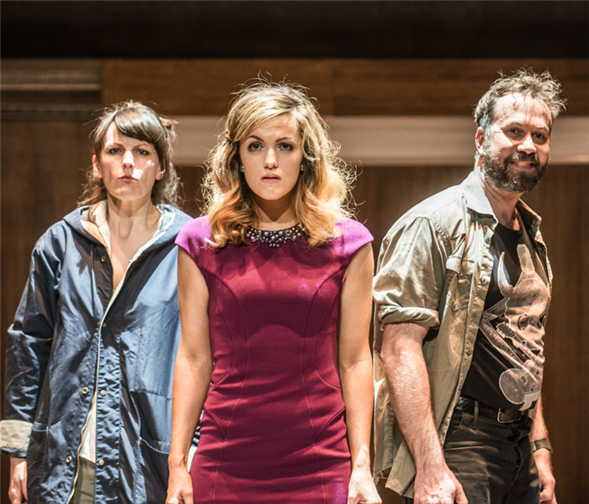Translate Page

Why Enda Walsh and Donnacha Dennehy created their first opera
---
The Irish playwright Enda Walsh made his name with works that are simultaneously poetic and unsettling. And although he won a Tony for his book for Once, it's in the less mainstream combination of the inexplicable and the banal where he feels most at home. "My work has never been really literal, that's for sure," he says. For proof, look no further than his latest project The Last Hotel, created with Irish composer Donnacha Dennehy.
Walsh's first opera, The Last Hotel, is being presented through Sunday by St. Ann's Warehouse, in a co-presentation with the PROTOTYPE Festival and the Irish Arts Center. Like Lazarus (his David Bowie collaboration that plays at New York Theatre Workshop through next week), this piece is more of a fever dream than a hyper-literal, understandable musical work.
"What I've always wanted to work towards was to get lost in form," Welsh explains. "It bores me to make a proper play. I couldn't write the plays that I wrote when I was a younger man. To me they're told too clearly, too literal, and too simple. You must look at the proper plays and take four steps to the left."
For The Last Hotel, Dennehy initially approached Walsh five years ago with a striking idea: a piece about a woman who arranges her own suicide. Dennehy had encountered stories of people meticulously planning their own demise, and he was compelled by that preparation. "The thing that really struck me in these situations is they rehearse the suicide as well," Dennehy says. "So it's rehearsing for your own death, and there's something really strange and actually theatrical about that. And also kind of terrifying."
Accordingly, the opera takes place in a dingy hotel, where the unnamed woman is staying with a couple who will assist with her suicide, in exchange for a large sum of money. Little by little, the show reveals their inner lives, as well as their conflicting feelings about the situation.
"Myself and Donnacha wanted to make something about us really embracing our suburban Dublin-ness and going, what's under the nails of these characters?" explains Walsh. "That's where the piece sort of is. It's in the aching silences."
{Image1}
The production isn't completely silent, of course: It's built around Dennehy's music, which mixes symphonic arias, introspective overtones, synth, and (in one pivotal scene) samples of a B*Witched song. Dennehy's previous projects include chamber vocal music (including a song cycle about the Irish famine called The Hunger) and Crash Ensemble, an electro-acoustic group he founded. The score of The Last Hotel features an electric guitar, which is one of the instruments he explored with Crash.
"One thing also about the music is it gets deep into subtext," says Dennehy. "There's certain meaning of the words that they say, that you can understand straightforwardly, but the music is often suggesting something else. It's reading a subtext of the text. That is an addictive thing for me, and I really love it."
Considering both Dennehy and Walsh's penchant for the inexplicable, it's fitting that The Last Hotel is running this month. It's aruguably the most high-profile offering at this year's Prototype (co-produced by Beth Morrison Projects and HERE).
Prototype's works tend toward the experimental, multidisciplinary, and downright weird, and this level of innovation helps them pack an opera-sized emotional punch, even if they are smaller and more intimate than the productions at the Met. It matters, too, that these contemporary pieces focus on the mental anguish of regular people instead of gods, demons, kings, and queens.
"It's a very exciting period in the absence of proper, more institutional support of the art form in that all of this stuff is just growing anywhere," says Dennehy. "There's kind of an explosion of new operas, and this Prototype Festival is a really important part of that actually."
Support for The Last Hotel, which also played at the Edinburgh Fringe and the Royal Opera House in London, has convinced Dennehy and Walsh to keep investigating opera as a viable, modern form. This spring, Walsh plans to write a new libretto, after which Dennehy will compose the score. (The two are mum about the subject matter.)
Asked why operas appeal to him, Walsh says, "I think these arias, just the scale of the musicality of it, just the richness – it's so large. We carry around within us something that is a lot more articulate and beautiful and potentially sort of poetic, and they exist in a universal, real, deep understanding. And these arias allow these people to just jump, to go into that place."
---
Follow Diep Tran at @DiepThought. Follow TDF at @TDFNYC.